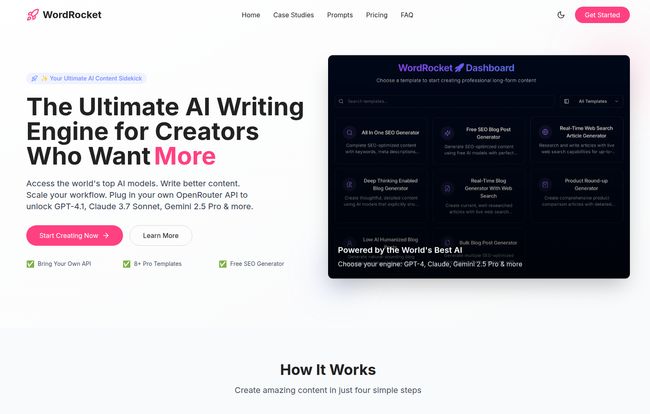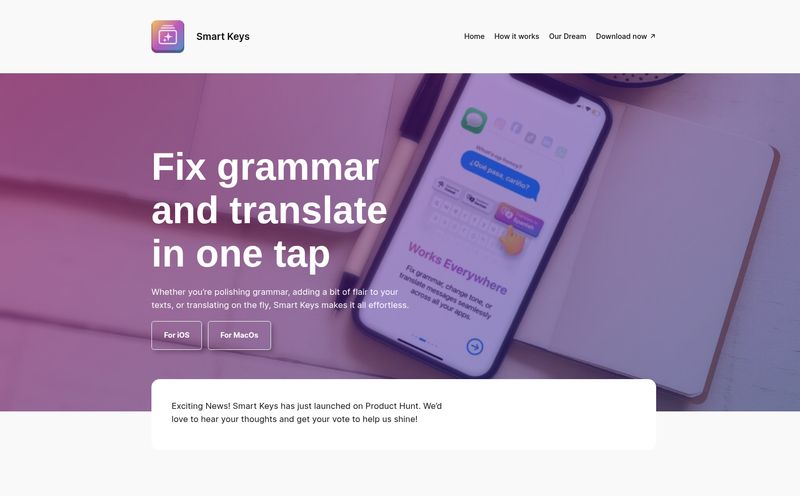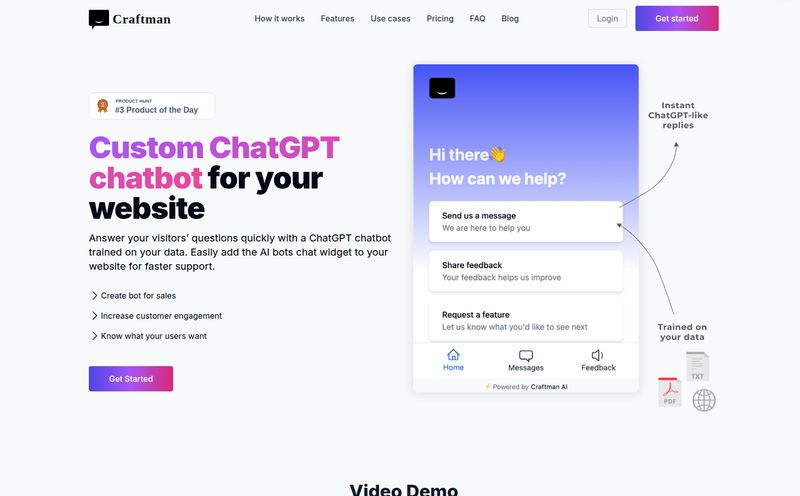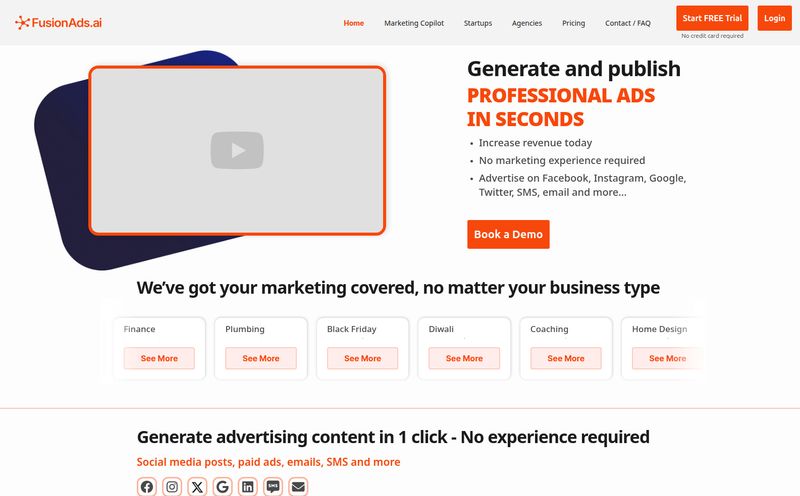In the world of SEO and content marketing, we get bombarded with “the next big thing” at least twice a week. Another AI writer promising to solve all our problems, another platform that claims to automate creativity. Most of them are, frankly, variations on the same theme. They give you a bland, one-size-fits-all text editor that spits out content with the personality of a toaster.
So when I first stumbled upon WordRocket, my initial reaction was a healthy dose of skepticism. “The Ultimate AI Writing Engine for Creators,” the headline proclaimed. Bold claim. But then I started poking around, and my interest was… piqued. This one felt different. It wasn’t just another pretty interface wrapped around a single API. It seemed to be built by people who actually understand the daily grind of producing content that doesn't just exist, but actually ranks.
What Exactly Is WordRocket? (And Why Should You Care?)
At its core, WordRocket is an AI content generation platform. But that's like saying a Ferrari is just a car. The devil, as always, is in the details. Unlike many tools that lock you into their model of choice, WordRocket takes a more open approach. It’s designed to be a control panel, giving you access to the heavy hitters of the AI world—we're talking GPT-4, Claude 3, and even Gemini 1.5 Pro.
How? It integrates with OpenRouter, which is basically a switchboard for large language models. This means you bring your own OpenRouter API key to the party. For some, that might sound like a hassle. For a control-freak SEO like me, it's a dream. You're not at the mercy of the platform's markup on AI credits; you're paying the source directly and can switch between models depending on the task. It's like having a high-end meal kit instead of a microwave dinner. You get all the best ingredients and a proven recipe, but you’re still the chef.

Visit WordRocket
The Features That Actually Matter for Content Marketers
Okay, so it has good AI models. What else? This is where WordRocket starts to pull away from the pack. The features aren’t just fluff; they solve real, tangible problems for content creators.
The Template Library: More Than Just a "Blog Post" Button
I’ve lost count of AI tools where the “Blog Post” template is just a text box that asks for a title. It’s lazy. WordRocket’s templates are noticeably more specialized. You've got things like an “All in One SEO Generator,” which aims to build a full, structured article, and a “Real-Time Web Search Enabled” option. That's huge. It means your content isn't just pulled from the AI's memory of 2022; it can include current information, making your articles instantly more relevant and authoritative. There’s even an “AI Humanized Blog Post” template, which seems to focus on tone and flow—a direct shot at the robotic-sounding output we all dread.
Bring Your Own Key (BYOK): The Pro Move
I touched on this already, but it's worth repeating. The “Bring Your Own Key” model is a sign that this tool is for professionals. It means a few things:
- Cost-Effectiveness: You’re not paying an inflated, per-word rate set by the tool. You pay for your API usage directly through OpenRouter, which is often much cheaper.
- Flexibility: A new, amazing model drops? You don't have to wait for WordRocket to integrate it. If OpenRouter has it, you likely have access to it.
- Transparency: You know exactly what you're spending and which model is doing the work. No more guessing games.
Sure, it requires a five-minute setup to get an OpenRouter key, but the long-term benefits in control and cost are a no-brainer for any serious operation.
Wait, I Can Inject Custom HTML?
Okay, this was the moment I went from “interested” to “very interested.” WordRocket has a feature to insert custom HTML elements directly into the generated content. This might sound nerdy, but for SEO, it is everything. Think about it. You can program it to automatically include:
- Custom-styled `div` blocks for call-to-actions.
- Pre-formatted tables for comparisons or data.
- Specific image tags with alt text.
- Even schema markup or structured data snippets.
This single feature transforms the tool from a simple writer into a genuine content automation engine. You can create perfectly formatted, on-brand, and SEO-optimized articles that are nearly ready to publish the moment they're generated. That saves a ton of time in post-editing.
My Honest Take: The Good, The Bad, and The Beta
No tool is perfect, especially one that's still in beta. So here's my unfiltered take. The platform is clean, fast, and the output quality, based on the models it uses, is top-tier. The testimonials on their site from folks in growth marketing and e-commerce seem to back up the idea that it delivers real results.
But let's be balanced. The biggest “con” is also a pro: the BYO API key model will scare off absolute beginners. If you’ve never heard of an API, this might not be the best starting point for you. Also, since it's in beta, there might be the occasional bug or an undeveloped feature. And the big question mark is the final pricing structure, which hasn't been announced yet. But for now, the access model is pretty darn attractive.
Let's Talk About WordRocket's Pricing
This is where things get interesting. Right now, during its beta phase, WordRocket is running a pretty sweet deal. You can get started for free, provided you bring your own OpenRouter API key. This is the ultimate “try before you buy” scenario, as your only cost is the actual AI model usage, which is typically pennies per article.
They also offer a $49 “Beta Access” option. From what I can gather, this seems to be a one-time payment that grants you full, unlimited access to all features, templates, and future upgrades during the entire beta period. It’s a bet on the platform's potential. If you try the free version and love it, grabbing the beta access could be a smart move to lock in access before a recurring subscription model is introduced. As their site says, “Pricing will be announced after beta period.”
Final Thoughts: Is WordRocket Worth a Shot?
So, who is this for? If you're a solo blogger who just wants to write about your hobbies, this might be overkill. But if you are an SEO professional, a content marketing agency, a SaaS startup, or an e-commerce business trying to scale your content production without sacrificing quality or structure, then yes. WordRocket is absolutely worth a shot.
It’s a tool built with a clear understanding of the on-page SEO workflow. The focus on multiple models, specialized templates, and particularly the custom HTML insertion, shows a commitment to professional-grade features. It’s not trying to be everything to everyone, and that’s its greatest strength. It’s a power tool for people who know how to build.
Frequently Asked Questions about WordRocket
How is WordRocket different from Jasper or Copy.ai?
The main difference lies in the 'engine'. While tools like Jasper often use their own fine-tuned version of an AI model, WordRocket gives you direct access to a variety of best-in-class models like GPT-4 and Claude 3 via OpenRouter. Plus, its features, especially custom HTML insertion, are more geared towards technical SEOs and content managers who need granular control.
Is it hard to get an OpenRouter API key?
Not at all! It takes about five minutes. You just sign up on the OpenRouter website, add some credits, and they'll give you an API key to copy and paste into WordRocket. There are plenty of guides online if you get stuck.
What kind of content can I really make with this?
Beyond standard blog posts, you can create SEO-optimized articles, product reviews, detailed guides, web-researched content, and even human-like opinion pieces. The ability to insert custom HTML means you can also create complex pages with unique layouts, like product comparisons or feature lists, directly from the tool.
Will I lose my content after the beta ends?
While this isn't explicitly stated, it's highly unlikely. The platform has a built-in dashboard for managing your generated articles. Standard practice for any SaaS tool moving out of beta is to ensure users retain all their created data. Your content should be safe and sound.
Is the $49 beta access a one-time fee or monthly?
The wording on the site suggests the $49 Beta Access is a one-time fee that gives you full access for the duration of the beta period. It's designed as an early adopter offer before they switch to what will likely be a monthly subscription model post-beta.



